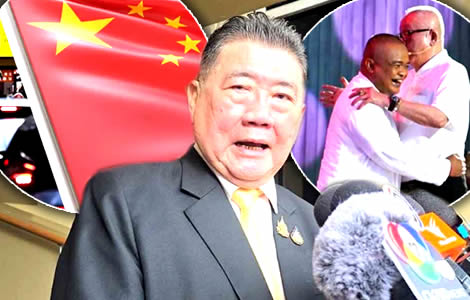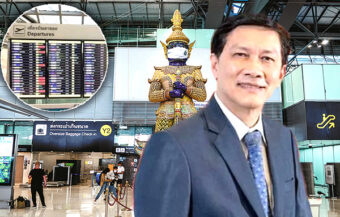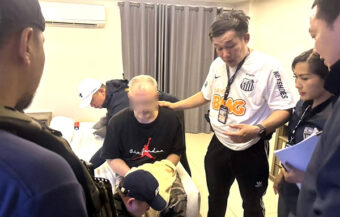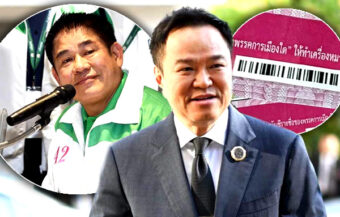Thailand edges closer to crisis as former rivals unite against Prime Minister Paetongtarn amid looming export tariffs, a surging baht and a deepening political scandal over Senate election rigging. Rising debt and ongoing protests intensify fears that the fragile coalition may collapse, putting both democracy and economic stability at risk.
On Sunday, Deputy Prime Minister Phumtham Wechayachai struck a concerned tone but insisted the government’s door remained open after news broke that former street protest leaders Jatuporn Prompan and Sondhi Limthongkul had joined forces to challenge the government. The threat comes at a critical moment for the country, as it struggles with a looming barrier of higher US tariffs on exports and a string of political scandals that risk shattering cabinet unity. In short, Thailand once again finds itself trapped in a dangerous political impasse—one that could not only topple the government but imperil democracy itself.

Thailand may be inching toward a dangerous tipping point—politically, economically and socially. As the recovery weakens, tensions are spilling from parliament onto the streets. The public mood has soured amid fears of foreign infiltration, runaway debt and a fragile alliance of old enemies.
In April 2025, the University of the Thai Chamber of Commerce reported its consumer confidence index dropped to 55.4. That figure, down from 56.7 in March, marked the third straight monthly fall and the lowest point since September 2024.
Economists blamed concerns over U.S. tariffs, political uncertainty and Thailand’s sluggish economic rebound.
Grey Chinese capital and collapsing industry worsen public sentiment and threaten Thailand’s economy
While domestic sentiment slumps, industrial output is also taking a hit. Manufacturing productivity has tumbled, and household debt remains dangerously high. Efforts by the Bank of Thailand to control lending have begun to curb discretionary spending. But perhaps the most corrosive threat is harder to spot—grey Chinese capital destabilising entire industries from within.
Since the start of the U.S.–China trade war in 2018, Chinese firms have increasingly used Thailand as a backdoor to global markets. The trend worsened after COVID-19. Now, sectors from logistics to agriculture are dominated by Chinese-linked businesses—some operating illegally. Many exploit legal loopholes, smuggle workers, or sidestep Thai laws. Beijing, critics say, is quietly complicit.
These firms undercut Thai businesses by slashing costs and dodging taxes. The effect has been to inflate export figures with ghost shipments and channel profits back to China. Local firms struggle to compete. Even more worrying, this artificial export boom has strengthened the baht, pricing out foreign tourists.
In March 2025, exports surged 17.8% as companies raced to beat the April 2 U.S. tariff deadline. Analysts warn this bump is temporary and could soon reverse. April’s numbers are expected to show another uptick—but again, not one that will last.
Soaring baht hits tourism just as economy shows signs of slowing and political tensions intensify further
Tourism has become collateral damage. A strong baht has made Thailand more expensive for travellers. This undercuts one of the nation’s most vital income streams. Thai hospitality businesses are now reporting sharp declines.
Despite the risks, the Thai economy is still posting modest growth. However, experts predict a downturn is coming. Falling exports, reduced income and even a trade deficit could hit by late 2025. Without structural reforms, Thailand may spiral into deeper stagnation.
Yet while the economy staggers, politics is entering a stormier phase. On Sunday, former street protest leaders Jatuporn Prompan and Sondhi Limthongkul joined forces publicly. Once fierce rivals, they now share a new mission: to block what they call the unchecked power of former Prime Minister Thaksin Shinawatra.
Their alliance, announced at Thammasat University, shocked many. Sondhi said Jatuporn had changed and no longer served Thaksin. Jatuporn agreed—and warned that Thaksin still pulls strings through his daughter, Prime Minister Paetongtarn Shinawatra. Both men vowed to stop him.
Anti-Thaksin alliance targets maritime MOU and casinos while threatening new round of street protests
They’re already focusing on flashpoints. First is the controversial Cambodia maritime MOU, which Sondhi says surrenders oil-rich territory to Phnom Penh. Then comes the Entertainment Complex Bill, which would legalise casinos. Critics claim it’s a corruption trap. Jatuporn and Sondhi say it’s a smokescreen for money laundering.
Both leaders have signalled street mobilisation may follow. Sondhi warned that if the maritime MOU isn’t scrapped, mass protests will erupt. They’re not bluffing. Street action has long been their weapon of choice.
Inside the government, fractures are deepening. The Pheu Thai–Bhumjaithai alliance, once a marriage of convenience, now looks brittle. At the centre is a scandal tied to the June 2024 Senate election. The Department of Special Investigation has uncovered signs of systemic fraud and vote-buying.
The Bhumjaithai Party is under scrutiny. While it denies the allegations and threatens lawsuits, the pressure is rising. DSI officials say the irregularities are damning. More lawsuits filed this week confirm the scandal isn’t going away.
Senate vote fraud scandal and Thaksin-linked tensions fuel crisis inside the ruling coalition government
The alliance itself began on August 22 2023, when Thaksin returned from exile. It was the product of an engineered coalition between Pheu Thai and ultra-conservative camps. That deal paved the way for Srettha Thavisin to become prime minister on the same day. After he stepped down, Paetongtarn took over. But now, cracks are showing.
Observers say the Senate scandal could destroy the alliance. If the case is buried, public anger may explode. If it’s pursued, Bhumjaithai could bolt—collapsing the government. Either path risks instability.
Then came another blow. On May 22, the Supreme Administrative Court ruled against Yingluck Shinawatra, Thaksin’s sister. She was ordered to pay ฿10 billion in damages over her failed rice pledging scheme. The verdict was widely seen as a message to Thaksin himself.
By Saturday, rumours spread that Thaksin had fled again. Aides denied it. Jakraphob Penkair, a longtime ally, said the ex-premier was “laughing” at the gossip and was still in Bangkok. Even so, scrutiny of his short prison stay continues.
The Medical Council has acted against three doctors who allegedly faked medical diagnoses to keep Thaksin in hospital. Public frustration is mounting. Many believe powerful figures are once again escaping justice.
Government faces online dissent, street-level frustration and growing anger over perceived elite impunity
From overseas, more pressure is mounting. Finland-based dissident Janya Yimprasert reappeared online, reposting an old open letter demanding Thaksin support the radical Progressive Movement. The timing of the post—just as tensions reignited—sparked fresh speculation.
Meanwhile, government voices tried to project calm. On Sunday, Deputy Prime Minister and Defence Minister Phumtham Wechayachai commented on the Jatuporn–Sondhi alliance. He said it was their right to protest—if done legally. “We’re working and ready to listen,” he added.
Phumtham’s remarks came during growing speculation about whether protests could explode again. His insistence on legality was seen by some as a veiled warning.
Still, the mood in Bangkok is uneasy. Political insiders whisper of more resignations and legal challenges. The Pheu Thai–Bhumjaithai marriage looks increasingly unsustainable. If Thaksin is seen as meddling, or if Bhumjaithai resists the Senate probe too fiercely, the coalition could implode.
At street level, frustrations are rising. A Sunday Dusit Poll found most Thais are fed up with infighting. Top concerns included household debt, corruption and weakened national sovereignty. Many want real reforms—not more political theatre.
The Dusit Poll showed the government is on thin ice. 68.4% of respondents said they lack confidence in the coalition’s ability to steer the country.
Nearly 72% said they believed political conflicts would escalate this year. When asked about the new alliance between Sondhi and Jatuporn, 59.7% said they feared it would lead to a return of street protests. Only 21% expressed any trust in the government’s response.
The poll showed that public confidence in Thai politics is plunging. Most respondents cited the Senate corruption scandal, saying it sends “a bad signal for democracy.” Academics warn that inaction will only deepen the rot.
As foreign relations stall and the economy falters, Thailand drifts toward conflict with weak leadership
Thailand’s key institutions look weak. Diplomatic efforts with Washington have stalled. No reason has been given for the impasse, but analysts suspect U.S. concerns over rights violations and creeping authoritarianism.
With the baht artificially high and exports peaking, this is a dangerous moment for instability. Thailand needs a strong government to fix its broken trade system, reform investment rules and rebuild trust with global partners. Instead, it faces renewed street protests, foreign infiltration and legal chaos.
The coalition’s shaky foundation traces back to 2023. Pheu Thai only formed its government after the Senate blocked the Move Forward Party. That party now rebranded as the People’s Party, has lost steam under its new leader Nattapong Ruangpanyawut. Still, it remains the most credible reformist voice.
Government in peril over the coming weeks with Constitutional Court petition over Senate collusion conspiracy
Still hope for Yingluck after Supreme Court sets ฿10 billion civil liability. Lawyer cites new evidence
People’s Party Sirikanya attacks GDP growth claims by Minister. Points to rising Chinese transshipments
Shocking and real evidence of a massive Senate election collusion campaign. 1,200 people being probed by DSI
PM Paetongtarn confirms her father Thaksin will be in court on June 13th. Trade proposals sent to the US
Yet many voters feel betrayed. The Pheu Thai–conservative pact always looked awkward. Now, with Bhumjaithai under fire and ultra conservatives backing away from Thaksin, the alliance is fraying.
Thailand is entering a new, unpredictable phase. Not a full-blown crisis—yet—but dangerously close. Old enemies are making new alliances. The economy is being hollowed out. And democracy, some fear, may soon be abandoned altogether.
Join the Thai News forum, follow Thai Examiner on Facebook here
Receive all our stories as they come out on Telegram here
Follow Thai Examiner here
Further reading:
Senate allegations growing in strength as powerful investigation gets underway. 7,000 people tracked


















